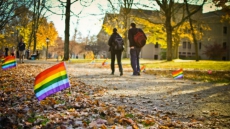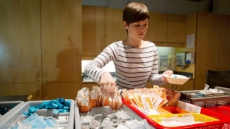IQALUIT, Nunavut — Lost on the tundra and low on fuel, Pauloosie Keyootak knew there was only one thing he could do to keep himself, his son and his nephew alive.
"I built an igloo with a small knife," the 62-year-old member of the Nunavut legislature said following his rescue Thursday night after eight days lost on the land.
Keyootak, his 16-year-old son Atamie Qiyuqtaq and nephew Peter Kakkik, 47, were spotted by a Twin Otter search plane well south of their intended route between Iqaluit and Pangnirtung. They were flown by helicopter to Iqaluit, where they were found to be in good condition.
Keyootak was back in his legislature office Friday and happy to explain in halting English — his first language is Inuktitut — how he and his companions became disoriented and kept themselves alive for more than a week in one of the most forbidding environments on Earth.
The trio set off from Iqaluit March 22. They were intending to snowmobile the 300-kilometre overnight trek to Pangnirtung. From there, they were to head up the Baffin Island coast to Qikiqtarjuaq, one of the communities in Keyootak's riding.
The trip, 11 hours in good weather, is well-travelled and studded with shelter cabins along the way.
But it also crosses rugged terrain, twisting along jagged coastlines and climbing over mountain passes.
And the weather wasn't good.
"We were in a kind of blizzard," Keyootak said. "That's why I got lost. I lost the trail road. I turned in the wrong direction between here and Pang."
Instead of heading northeast to Pangnirtung, the travellers were riding south down the shore of Frobisher Bay. By the time they realized their mistake, they didn't have enough gas to retrace their tracks.
With no communication equipment, there was nothing to do but hunker down in the high winds and -30 C temperatures and wait for help.

"My son and nephew, they got a caribou," said Keyootak. "That's how we survived — the meat from the caribou."
After a few days, the igloo began to break down, so Keyootak built another and the vigil resumed.
They had a few supplies — a camp stove, some fuel, tea, sugar.
"We had one sleeping bag, one mattress. That's all we had. The sleeping bag went for my son.
"He was the most important to keep warm. Me and my nephew used our parkas to cover ourselves every night. It's hard for me to survive in that kind of weather, cold in the night.
"During the day it was all right, when the sun was up. We would stay outside all the time. We would get up in the morning and go outside right away after drinking tea. We would stay outside and move around so we were not just sitting in the same place.
"Only when it got dark we'd stay inside our igloo. We'd drink tea and go to bed right away."
Teams with about 20 people from Iqaluit and Pangnirtung began searching the route on March 26. Three aircraft searched from the skies — a government of Nunavut Twin Otter, a Hercules from the Joint Rescue Coordination Centre in Halifax and a military Cormorant helicopter.
Elders and hunters offered advice about where travellers might hole up during a blow.
The weather stayed cold, but remained clear. The search grids expanded until the Twin spotted a snowmobile track and followed it to the improvised camp, where supplies of fuel and tea were running low.
"We had run out of everything the day we were found."
Keyootak said he will never forget the sight of the rumbling, twin-engine workhorse dropping from the sky.
"I was jumping happy. Very much. I was crying."
The travellers eventually returned to Iqaluit in the Cormorant.
"They were tired and hungry and thirsty when they got off the helicopter at about 10:30 (p.m.)," said government search spokesman Kris Mullaly
"They walked off under their own steam. They appear to be in good condition. They held their own out there until such a time as the search operation could find them."
Mullaly said travellers are strongly encouraged to carry a communications device, GPS, or emergency locator.
Dozens were involved in the search, which scoured up to 15,000 square kilometres of rock and ice.




